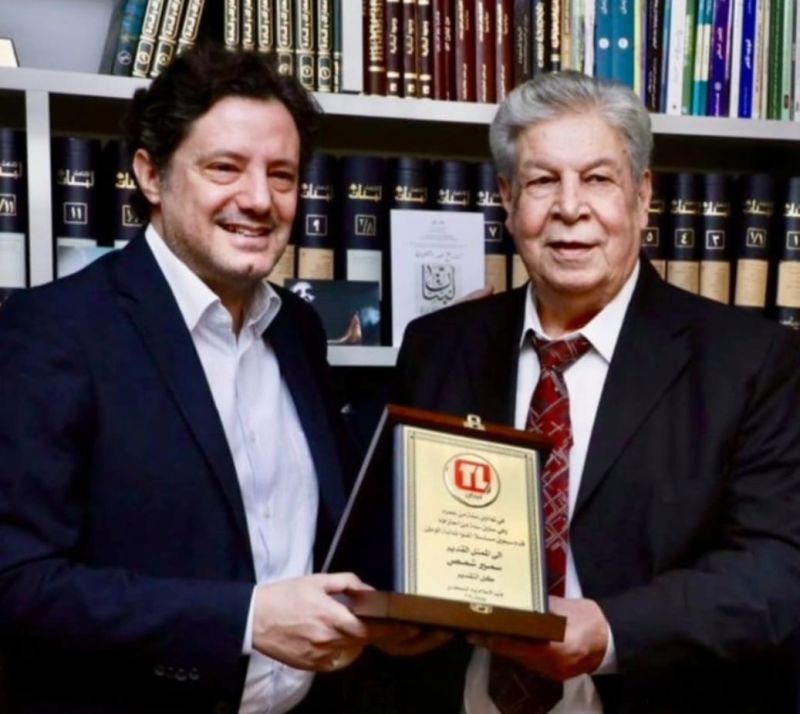
A few days after being transferred to the Hôtel-Dieu hospital, the great actor, journalist, and author Samir Chamas passed away due to health complications. Hailing from Baalbek (Hermel) and belonging to the Chamas family, this versatile artist, born in 1942 and who passed away on August 11, 2024, was one of the last icons of the golden age of stage and screen.
Samir Chamas, one of Lebanon's most esteemed actors, has taken his final bow. A multifaceted talent as an artist, journalist, and author, he was among the pioneers who collaborated with director Nizar Mikati and the artist Chouchou in establishing the national theater.
He starred in the legendary films of the Rahbani brothers alongside Fairouz in Safar Barlek in 1967 ("The Voyage of Barlek") and Bint el Haress in 1977 ("The Guardian's Daughter"). He also appeared in 27 films, including the Syrian classic Al Sharidan ("The Two Vagabonds") in 1965 with Duraid Lahham and in Egyptian films such as Thalath Nisa’a ("Three Women") in 1968, based on the novel by Ihsan Abdel Kouddouss, as well as Charih el-Dabab ("The Street of Fog"), both co-starring the Lebanese icon Sabah. In 2005, he appeared in the controversial film Al Bahithat an alhurriya ("Women in Search of Freedom"), directed by the avant-garde filmmaker Inès Al-Deghaidy.
In an interview, Samir Chamas revealed that during his career, he was set to sign a contract for a series of Egyptian films with one of the most renowned producers, Ramsès Naguib. However, this grand project was thwarted by the sudden death of the producer. In 2000, he acted alongside the legendary Faten Hamama in Wajh el qamar ("The Face of the Moon") and delivered a memorable performance with veteran actress Samira Ahmed in Imra’a min zaman el hubb ("A Woman from the Time of Love") in 1998. Samir Chamas returned to Beirut in 2004 to star in the Lebanese series Un homme du passé.
Lebanese and Arab audiences particularly remember him as Jad, the protagonist of the popular series Al-Nahr ("The River"), written by Marwan el Abed and broadcast in black and white in 1974 on Télé Liban. In the series, Nisrine (played by the late star Noha el Khatib Saadé) encounters a young man named Jad, who is wounded near the river. She falls in love with him and is determined to help him at any cost. At that time, "Jad" and "Nisrine" became popular names for newborns in Lebanon and across the Arab world. The public also fondly remembers his role in Ghouroub ("Sunset"), alongside Hind Abillamah and Mahmoud Saïd.
 The Minister of Information Ziad Makari paid tribute to him a few months ago by presenting him with the Télé Liban Award.
The Minister of Information Ziad Makari paid tribute to him a few months ago by presenting him with the Télé Liban Award.Photo Credit: Official Instagram account of Ministry of Information Ziad Makari
"I recognized his brilliance when I heard him mimic characters, nature sounds, and animals," recalls Salah Tizani, known as Abou Salim, who was among the first to discover Chamas' talent when he was living in Tripoli and had joined the "Al-Jarrah" scouts.
Samir Chamas was also a talented writer, initially working in journalism before writing scripts for television and film, as well as creating television and radio programs. In 2006, he published his first science fiction novel, Aux confins de l'univers ("At the Edge of the Universe"). He had written several other literary works that he intended to publish when the time was right.
It had been fifteen years since he last appeared in a television series. Yet, his physical presence, charisma, skill, and distinctive voice remained undiminished. He conducted numerous diction workshops, drawing on his deep knowledge, eloquence, and mastery of classical Arabic. Why did he choose to focus on dubbing foreign series, which were popular at the time?
In an interview, Samir Chamas recounted an incident with a producer who, despite the success of the series, failed to pay him his due. After taking legal action, Chamas decided to focus on dubbing, which provided a stable income. Married to actress Siham Abou Al-Ezz, he was the father of a son, Rabih, and a daughter, Rima, whom he considered the true treasures of his life. His final television appearance was on the show The Authenticity Album ("Album El Assala") hosted by journalist Robert Franjieh, where he recounted his early days in Tripoli and his rise in Egyptian cinema. After recording the episode in his office, Minister of Information Ziad Al-Makari honored him with a tribute by presenting him with the Télé Liban Award.
Read more



Comments